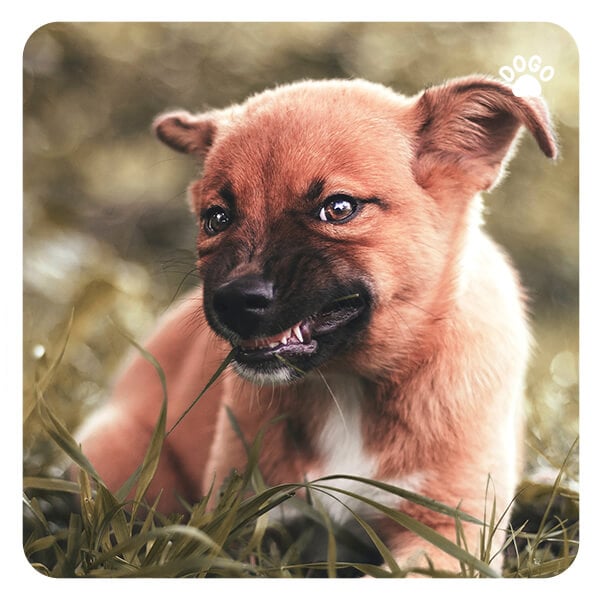What is Reactivity in Dogs?
Post Date:
July 18, 2024
(Date Last Modified: November 13, 2025)
Reactivity in dogs is a pattern of over-threshold arousal and intense behavioral responses to specific stimuli, distinct from routine alertness or play. The term describes observable episodes when a dog’s internal arousal level crosses a threshold and produces outsized vocal, postural, or locomotor reactions.
Definition of Reactivity in Dogs
Operationally, reactivity refers to a rapid escalation of arousal above a behavioral threshold that produces intense responses such as barking, lunging, or a fixed stare rather than calm investigative behavior. Reactive episodes commonly escalate very quickly, often within 1–3 seconds of a trigger during leash encounters or sudden stimuli[1]. Unlike normal alertness or play, reactivity is characterized by an intensity and loss of self-control that is predictable to specific cues and may not subside without interruption.
Examples of common reactive behaviors include sustained barking or growling when a stimulus is present, forward lunging or pulling on the leash, intense fixating or hard stares, rapid pacing, and redirected mouthing or snapping toward nearby people or objects.
Key Behavioral Signs and Body Language
Owners can read a dog’s body language to identify rising arousal and the transition to reactive episodes. Many behavior frameworks break escalation into three stages—pre-escalation, escalation, and peak-reactivity—to help owners notice early warning signs and intervene before loss of control[2]. Pre-escalation often shows subtle cues such as a fixed glance, slight body tension, lip licking, or focused ears; escalation includes stiff posture, raised hackles, increased vocalization, and forward movement; peak-reactivity includes full lunging, continuous barking, or snapping.
Facial expressions and posture provide reliable clues: a stiff body, closed mouth with hard stare, and fixed weight forward indicate higher arousal, whereas loose body movement, soft eyes, and play bows indicate safe, social arousal. Vocalizations vary by intensity—short alert barks may indicate attention, while rapid, high-frequency barking combined with forward momentum typically indicates reactive escalation.
How Reactivity Differs from Aggression and Fear
Reactivity is a behavioral description of intensity and threshold; it is not a single motivation. Defensive aggression is a motivational category where a dog perceives threat and may escalate through warnings to bites, while fearful avoidance is primarily withdrawal to escape perceived danger. Distinctly, reactive dogs may show aggressive signals without the same intent to injure seen in compulsive or predatory aggression, and they may not show the avoidance pattern typical of fear-only responses.
Clinical data show that reactive displays comprise a large share of behavioral consultations and are often the presenting problem even when owners describe their dog as “aggressive,” which affects risk assessment and treatment planning; in some clinic series reactive behavior represents roughly 40% of behavior consultations, so correct labeling matters for management and safety[3].
Because motivations differ, the risk profile also shifts: a dog that is reactive due to frustration on leash may pose a different bite risk and require different management than a dog that bites defensively due to pain or fear. Accurate differentiation guides safe handling, training strategies, and whether medical workup is needed.
Common Triggers and Typical Contexts
Typical triggers for reactivity include other dogs (on- or off-leash), unfamiliar people approaching the dog or owner, bicycles and scooters passing suddenly, vehicles, and sudden loud noises. Environmental context magnifies reactivity: being on a leash, confined in a crate, or in crowded spaces often lowers a dog’s ability to avoid triggers and raises the likelihood of an over-threshold response. Dogs frequently show predictable temporal patterns—many guardians notice more reactivity during high-traffic daytime hours or during peak exercise times—and leash-related reactivity commonly presents during walks near sidewalks or parks.
Field surveys and practice reports identify interactions with other dogs as one of the most common leash-related triggers, often reported by owners as the single trigger most likely to provoke a reactive display in public settings[4].
Underlying Causes and Risk Factors
Reactivity has multifactorial origins that include genetic temperament, developmental experiences, and medical contributors. Critical early socialization windows are well recognized in canine development; inadequate social exposure during the primary socialization period—classically cited between 3 and 14 weeks of age—raises the risk of later reactivity to unfamiliar stimuli[5]. Genetics and temperament interact with experience so some breeds or lines show higher baseline reactivity risk but environment modifies expression.
Other risk factors include early trauma, inconsistent reinforcement of reactive displays (owners inadvertently rewarding early lunging by creating distance), chronic stress, pain, and sensory impairments such as glaucoma or hearing loss that can change how a dog perceives and reacts to its surroundings. Medical conditions—dental pain, musculoskeletal pain, hypothyroidism, or neurologic disease—can increase irritability and lower tolerance to triggers, prompting a veterinary assessment when reactivity is new or sudden.
Assessing Reactivity: Evaluation and Thresholds
Systematic evaluation begins with mapping a dog’s threshold and building an escalation ladder from calm to peak-reactive states. A practical threshold map often notes the distance at which a dog first freezes, then the distance where barking begins, and finally the distance where lunging or lunging with barks occurs; many teams start assessments at distances of 50–100 ft (15–30 m) and approach incrementally while noting behavioral marks and physiological signs such as panting or trembling[1].
| Stage | Typical Distance | Common Behaviors | Owner Response |
|---|---|---|---|
| Calm | 50–100 ft (15–30 m) | Loose body, attention to handler | Maintain distance, reward focus |
| Pre-escalation | 30–50 ft (9–15 m) | Alert stare, slight tension | Increase distance, cue focus |
| Escalation | 10–30 ft (3–9 m) | Lunging, barking, raised hackles | Create barrier, move away |
| Peak-reactive | <10 ft (<3 m) | Full lunge, snapping | Do not force interaction; manage safety |
Useful assessment tools include structured behavior histories, short video examples of incidents, and standardized checklists used by clinicians; in-home assessments are preferable when the dog’s reactivity is situation-specific and replicable at home, while clinic assessments suit cases requiring controlled testing or medical workup.
Immediate Management and Safety Strategies
Short-term safety focuses on distance, barriers, and appropriate restraint. Keep a minimum buffer from triggers and use environmental management to prevent repeated reinforcement of reactive displays. Emergency calming should prioritize predictable, low-arousal responses: slow movement away from the trigger, minimal eye contact, and avoiding punishment that increases arousal.
- Maintain distance and situational awareness; when possible, use at least a 6-foot (1.8 m) leash and avoid crowded routes to reduce encounters[2].
- Use physical barriers (parked cars, planters) and body positioning to interrupt line-of-sight to triggers and create safe escape paths for the dog.
- Implement household safety plans: restrict access to front doors, post visitor guidance, and keep signage or alerts for delivery workers and guests.
Restraint choices should prioritize control without increasing panic; properly fitted harnesses and non-retractable leashes reduce the likelihood of sudden breakaway and provide predictable handling during walks. For acute incidents that include escalation to biting, seek immediate veterinary and behavior-help as described below.
Training and Behavior-Change Approaches
Evidence-based approaches focus on changing the dog’s emotional response to triggers rather than suppressing outward behavior by force. Desensitization and counter-conditioning performed at or below the dog’s threshold, paired with consistent positive reinforcement for calm or alternative responses, are core strategies. Programs commonly progress slowly over weeks to months; many behavioral plans set an initial active training window of 8–12 weeks for measurable change when owners practice daily under threshold conditions[4].
Specific exercises include reward-based focus and impulse-control drills, teaching reliable cues for attention and leave-it, and graduated exposure where the dog is rewarded for remaining below threshold while the trigger is present at manageable intensity. Maintenance practice and occasional refresh sessions are necessary to prevent relapse, and trainers often recommend incorporating novel contexts and variable reinforcement schedules to generalize improvements.
When to Seek Veterinary or Professional Help
Seek veterinary attention when reactivity is sudden in onset, associated with signs of pain, neurologic change, or when severity escalates rapidly over 48–72 hours; such presentations need medical rule-outs including pain syndromes, endocrine disorders, or neurologic disease[3]. Red flags that warrant immediate professional behavior or medical input include repeated bites to people or animals, escalating frequency or intensity of reactive episodes, and any signs of medical decline.
Veterinarians can perform medical screening and, when appropriate, refer to a board-certified veterinary behaviorist or qualified, force-free trainer. A professional behavior plan typically includes baseline assessment, a written stepwise training and management protocol, and periodic reassessments; initial improvement timelines vary but responsible plans set expectations for measurable change within weeks and sustained behavior change over months.
Prevention, Prognosis, and Long-Term Outcomes
Prognosis depends on early intervention, consistency of management, and whether medical contributors are addressed; dogs that receive early, threshold-based training and consistent reinforcement generally show the best outcomes. Factors that improve prognosis include owner compliance, predictable management of the environment, and graded exposure training begun before behaviors become deeply entrenched[5].
Prevention strategies start in puppyhood with broad, positive socialization exposures during the critical window and continued controlled introductions across life stages. Long-term maintenance may include scheduled refresh training, managed environments in high-risk contexts, and support from trainers or behaviorists as life circumstances change. Breed and age variations exist—some breeds with strong prey or guarding drives may require more persistent management, and older dogs with new reactivity should always have a medical evaluation.
Sources
- merckvetmanual.com — clinical behavior and veterinary medicine resources.
- avma.org — American Veterinary Medical Association guidance on behavior and handling.
- aaha.org — American Animal Hospital Association client and clinical resources.
- wsava.org — World Small Animal Veterinary Association behavior and welfare recommendations.
- vcahospitals.com — VCA veterinary behavior and socialization resources.




